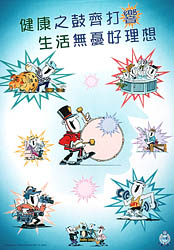



















 Young poster artists Hau Wai-shan and Hau Wai-lim are always included in their dad's healthy lifestyle pursuits |
NO doubt about it, the Healthy Lifestyle
campaign appears to be taking hold and sinking in. Slowly but surely there's an unmistakable
cultural change and growing shift in attitude among Force members when it comes to
choices in off duty pursuits. Everywhere you look the Force gyms are packed, police sporting
events are over-subscribed by participants, memberships of clubs promoting worthwhile
pursuits are swelling, and police officers are getting their physical, mental and financial acts
together while enjoying their leisure hours with family and friends.
No where was this more apparent that at the recent Healthy Lifestyle Day that saw almost 3,000 Force members and their families enjoy a great afternoon at the Police Sports and Recreation Club. |
|
One of the highlights of the day was to recognise the best entries from the Fit for Tomorrow Poster Competition. You can see some of the better posters by turning to the centrespread, but before you do, OFFBEAT would like to salute Police Constable Choy Yuk-wah, HMTDIV, whose winning poster (far right) employs the rousing image of a drum "to awaken and inspire people to live healthy lifestyles". PC Choy created the poster, which took about a week, using design software on his home computer. "The process of designing a poster such as this allowed me the opportunity to think more deeply about what it means to live a healthy lifestyle," said the creative police constable who won the Force's anti-gambling poster design competition last year. | |
|
We'd also like to salute Hau Wai-shan and Hau Wai-lim (the sons of Police Constable Hau Tak-shing, EU NTS). Their poster won a distinguished award in the family member category. The Hau brothers have entered various poster design competitions and have additionally been rewarded with distinguished awards in the Force's anti-corruption and anti-gambling poster competitions. Hau Wai-shan, a Form One student, and Hau Wai-lim, in Primary two, said that they used the sun, bees and a rainbow in their poster to convey the messages of "health" and "naturalness". Painting is the Hau brothers favourite pastime. For his part, Police Constable Hau said that he encourages his sons to take part in worthwhile extra-curricular activities in order to establish healthy goals and to enhance their self-development. |  PC Choy Yuk-wah's winning poster |
One year after the implementation of a Force-wide pilot scheme to assess the impact and feasibility of reducing the police working week from 51 to 48 hours, the trial has shown that any improvement in conditions of service of police officers can only be achieved by a reduction in the number of days and not hours worked | |
|
TO assess the impact and feasibility of reducing
the police working week from 51 to 48 hours, a six-month pilot scheme involving selected
police units began on 20 April 1997.
A reduction in working hours (primarily intended to benefit frontline shift duty officers and those currently working a six-day week), is an issue that both management and staff have been pursuing for some years - its rational based on the overall stressful and physically demanding nature of police work which requires a 24-hour, 365-day-year service to the public. After six months the scheme demonstrated that reduced working hours had no deleterious effect on the law and order situation nor any discernible impact on the level of police efficiency, performance and service provided to the public. "At the same time, a significant decrease in expenditure on overtime allowance was achieved together with a reduction in the overall level of unrecompensed overtime," said Assistant Commissioner of Police, Support, Mike Dowie, adding that in general the trial scheme has been positive and welcomed by Force members. Consequently, a Force-wide trial of the reduction in working hours began on 19 October 1997, with all police officers and traffic wardens participating under the same conditions as the pilot scheme. The 48-hour week gave rise to an 8-hour working day for most officers. In general, the shortened working day was accommodated by adopting split or overlapping shifts, but presented practical difficulties to officers where a formal handover period between shifts was required. In addition, most UB officers derived little or no benefit from the reduced working hours, as they continued to work a full six-day week and were, effectively, still working an eight-and-a-half-hour and not an 8-hour day. "The Force-wide trial has shown the reduction in working hours has not had a detrimental effect on the level of service provided to the public, but that any improvement in conditions of service of police officers can only be achieved by a reduction in the number of days and not hours worked," said Mr Dowie. To this end, on Sunday November 1, frontline police officers and traffic wardens began working a standard 8-and-three-quarter-hour day, for a maximum of 11 days every fortnight. This equates to an average of 48 hours, seven-and-a-half minutes per week, which is slightly more than the present weekly working hours. Said ACP Dowie: "The revised work system will allow sufficient time for a full handover between shifts and permit officers to take a rostered day off once a fortnight in addition to the weekly leave day. As such, it represents a more efficient use of resources and a significant improvement to the conditions of service of most police officers." The 8-and-three-quarter-hour day will not be applicable to all units, particularly those working irregular hours, but it is anticipated that in the long term a standard work system will be adopted throughout the Force. "It should be noted that the reduction in working hours continues to be the subject of a Force-wide trial," said ACP Dowie, "and in due course the revised work system will be evaluated by the Commissioner to ensure that the aims of the trial have been achieved within the parameters set." Continued ACP Dowie: "During the remaining period of the trial, a visible presence of uniformed officers will be maintained on the streets of Hong Kong by the optimum use of human resources and the streamlining of existing work practices, including computer assisted information technology and communications. These and other initiatives will continue to form part of an overall strategy to ensure the current level of police service to the community is not impaired by the reduction in working hours." |
CERTAIN formations have interpreted the 2-week Police Work Cycle to mean that duties are rostered on the same shift throughout each 2-week cycle, i.e. two weeks on 'A' shift followed by two weeks on 'B' shift and then two weeks on 'C' shift etc. This is not the case and it was intended that officers should continue to work only one week on a particular shift and then rotate to the next shift. Formations should only roster officers to work the same shift for an entire 2-week cycle if there are compelling operational reasons. Any queries on the new work pattern may be referred to SP SD SUP on 2860-3757, or fax 2529-1544. In addition, as a result of the feedback from the trial scheme thus far, ACP Support has sent out a circular answering Force members? most commonly asked questions. |

